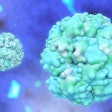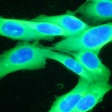
Cell-free DNA testing firm Natera on Friday announced that new data on its Signatera molecular residual disease (MRD) test will be presented at the annual meeting of the American Association for Cancer Research (AACR) taking place from April 14 to April 19 in Orlando, FL.
Data will be presented by Natera and its collaborators from five studies on the use of Signatera in esophago-gastric adenocarcinoma, muscle-invasive bladder cancer (MIBC), colorectal cancer (CRC), and hepatocellular carcinoma (HCC). The data includes long-term follow-up data from patients with muscle-invasive bladder cancer.
Other highlights of the data to be presented include the following:
- ctDNA prediction of tumor response and recurrence in patients with esophago-gastric carcinoma receiving FLOT + immunotherapy (avelumab) pre- and post-surgery
- ctDNA prediction of tumor response and recurrence in patients with MIBC, with and without neoadjuvant therapy, with long-term follow-up (median 68 months) after radical cystectomy
- Genomic profiling of >13,000 patients with early- (≤50 years old) versus late- (≥60 years old) onset CRC
- Potential of ctDNA to guide imaging-based surveillance strategies in patients after surgery for peritoneal metastases from CRC
- ctDNA as a pharmacodynamic and predictive biomarker in patients with resectable HCC treated with immunotherapy (cemiplimab) pre- and post-surgery
Five Signatera posters will be presented during the meeting; abstracts are available on the AACR meeting site.
Signatera is a circulating tumor DNA (ctDNA) test used for monitoring treatment and assessing molecular residual disease (MRD) in patients who have been previously diagnosed with cancer. The test is available for both clinical and research use, and has been granted three breakthrough device designations by the U.S. Food and Drug Administration (FDA) for multiple cancer types.



















